Flourish FM
What does it take to flourish? We started Flourish FM to share cutting edge research from world experts on how to thrive, so you can take away big ideas and practical steps to enhance your life, the lives of others, and, ultimately, make the world a better place. Flourish FM is hosted by Dr. Jon Beale and Dr. Nick Holton, and in collaboration with the Human Flourishing Program at Harvard University, the Department of Education at the University of Oxford, and The Shipley School.
Episodes
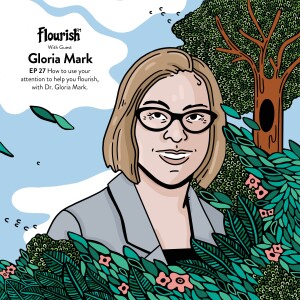
Sunday Jun 04, 2023
Sunday Jun 04, 2023
Today’s very special guest is Dr. Gloria Mark, the Chancellor's Professor of Informatics at the University of California, Irvine, and author of Attention Span: A Groundbreaking Way to Restore Balance, Happiness and Productivity. Her work is primarily focused on the deep examination of multitasking, interruptions, and mood as they pertain to the use of digital devices.
In our conversation, Gloria defines attention, the different types of attention, psychological balance, and flow. She also explains why attention is always goal-oriented, how we’ve developed kinetic attention in this digital age, whether our dwindling attention spans are cause for concern, and how we can use technology to promote well-being rather than productivity. Tune in now to learn how to use social media strategically, how to replenish your attention reserves, and so much more with the remarkable Dr. Gloria Mark!
Key Points From This Episode:
Joining us today is the author of Attention Span, Dr. Gloria Mark.
Gloria tells us about her research and what led her to write her book.
What attention is, and its role in well-being and living a fulfilled life.
The different types of attention.
How our attention resources are limited.
Gloria explains why our attention is always goal-oriented.
An introduction to kinetic attention.
Whether we should be concerned about the rapid reduction of our attention spans.
If our attention span and behavior change when we go offline.
How we’ve developed kinetic attention in response to the modern world.
Gloria’s hypothesis on why our attention spans have gotten shorter in this digital age.
The tension trap of randomly reinforced behavior.
How we can use technology to support well-being rather than productivity.
The role of psychological balance as it relates to the different types of attention.
Simple activities that you can do to replenish your attention reserve.
The attention trap of social media and how to use it strategically.
Gloria defines flow and its role in the working lives of people today.
The precondition to flow: a focused and engaged attention.
What Gloria means when she says that “rhythm is the new flow.”
Her lesson on flourishing for listeners, and practical ways to implement it.
Links Mentioned in Today’s Episode:
The Antifragile Academy
Dr. Gloria Mark
Attention Span: A Groundbreaking Way to Restore Balance, Happiness and Productivity
Dr. Gloria Mark on LinkedIn
Dr. Gloria Mark on Twitter
Dr. Gloria Mark on Facebook
University of California, Irvine
Columbia University
‘The broaden-and-build theory of positive emotions’
The Shipley School
Flourish FM Podcast
Flourish FM on Twitter
Flourish FM on Instagram
Jon Beale
Nick Holton
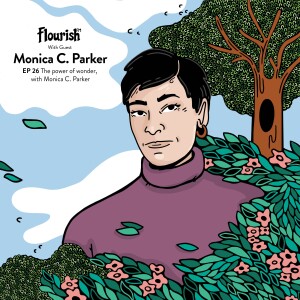
Wednesday May 17, 2023
Wednesday May 17, 2023
In this episode, we are very lucky to have an amazing conversation with the author of The Power of Wonder, Monica C. Parker! Monica is a prominent speaker and writer, the founder of HATCH Analytics, and has an unusually varied career, having worked as an opera singer, policy director, homicide investigator, CEO, and museum exhibition director!
In our chat, we get to pick Monica's brain about her research into what wonder can do for the human mind and body, and she explains how building a mindset focused on experiencing wonder can lead to continual flourishing. We get into her argument for aiming for wonder over happiness, how meaning and gratitude figure into her framework, and how to use curiosity as a powerful processing tool. Join us to hear it all!
Key Points From This Episode:
Monica shares an overview of her path to her current work researching wonder.
How the idea of flourishing fits into Monica's work.
Defining and conceptualizing wonder; Monica's focus on the emotional experience.
Understanding the roots of our ability to experience wonder.
Monica differentiates between shallow and deep curiosity.
Steps for developing a 'wonder mindset'; prioritizing novelty, mixed emotions, and more.
Tips for having a 'wonder-walk', and the power of priming the mind.
The practices that help us slow down the mind.
Monica speaks about the effects of nostalgic and grateful thinking.
The issue with aiming for happiness and our inability to forecast accurately.
How curiosity can help us process past traumas.
The composite effects of wonder on our mental and physical state.
Exploring Monica's argument for wonder being the highest good.
Measuring and assessing our relationships with these concepts.
Implementing the mindset of a beginner.
Fighting against the modern tendency to completely avoid boredom.
Monica's final lesson on flourishing and practical steps for its implementation.
Links Mentioned in Today’s Episode:
The Antifragile Academy
Monica C. Parker
The Power of Wonder
HATCH Analytics
Monica C. Parker on Twitter
Monica C. Parker on LinkedIn
Martin Seligman
Steve Jobs
Rick Hansen
Blast from the Past
Shigehiro Oishi
Todd Kashdan
Scott Barry Kaufman
Dacher Keltner
David Yaden
The Shipley School
Flourish FM Podcast
Flourish FM on Twitter
Flourish FM on Instagram
Jon Beale
Nick Holton
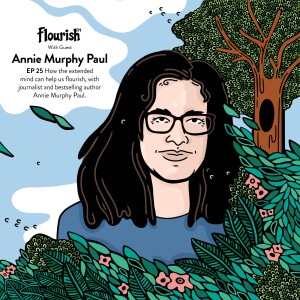
Wednesday May 03, 2023
Wednesday May 03, 2023
Today, we talk to journalist and bestselling author Annie Murphy Paul about how the “extended mind” can help us flourish. She is an acclaimed science writer whose work has appeared in the New York Times and Scientific American, among many other publications. She has also authored various books, including Origins, The Cult of Personality, and the topic of today’s discussion, The Extended Mind.
In our conversation with Annie, we discuss the extended mind's three types of cognition (embodied, situated, and distributed) and what it means to be a "loopy" creature. We explore practical strategies for leveraging distributed cognition in our daily lives, workplaces, and relationships, learn about the impact of physical spaces on perception, and other fascinating insights on the topic. Join us for an insightful episode that will broaden your understanding of the human mind and the world around us. Tune in now!
Key Points From This Episode:
Annie’s motivation for writing The Extended Mind and what she hopes to achieve.
Insight into the extended mind concept and its relationship to human flourishing.
Contrasting the extended mind with the view of the brain as the sole controller of the body.
Three types of cognition of the extended mind: embodied, situated, and distributed.
How the three types of cognition impact individuals, teams, and communities.
How thinking in groups and sharing ideas play into the extended mind concept.
Steps to achieving collective intelligence.
How digital and analog technologies extend our thinking and its relation to situated cognition.
Diversity in collective intelligence, distributed cognition, and team success.
How physical spaces impact cognition and the restorative effects of natural environments.
Physical movement, social interaction, and the role they play in thinking.
Practical strategies for utilizing distributed cognition in daily life, work, and relationships.
How the different types of cognition overlap in our daily lives.
Being a "loopy" creature and the role of physical movement and social interaction in thinking.
Whether non-embodied or non-extended thinking exists.
The best way to leverage the extended mind concept toward human flourishing.
Links Mentioned in Today’s Episode:
The Antifragile Academy
Annie Murphy Paul
Annie Murphy Paul on LinkedIn
Annie Murphy Paul on Twitter
The Extended Mind
‘The Extended Mind’
The Good Life
The Shipley School
Flourish FM Podcast
Flourish FM on Twitter
Flourish FM on Instagram
Flourish FM on YouTube
Jon Beale
Nick Holton
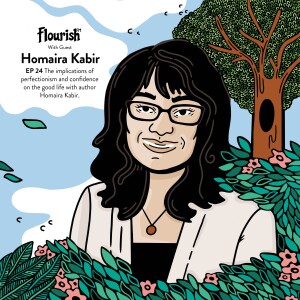
Wednesday Apr 19, 2023
Wednesday Apr 19, 2023
While our drive for excellence and perfectionism can help us to strive for great results and improvement, it can also come at a cost. On the show today, we welcome Homaira Kabir, life coach, speaker, and author of the new book Goodbye, Perfect. Homaira has a master's degree in coaching psychology, positive psychology, and the scientific study of human flourishing, and is also the founder and CEO of The Goodbye Perfect Project.
In our conversation with Homaira, we delve into her work, how she helps her clients, and some of the subject matter from her inspiring book. Our guest does an outstanding job of explaining the concepts of confidence and perfectionism and the connection between these two forces within us. She also introduces the idea of 'secure' striving, how to fall in love with yourself, and so much more. Make sure to tune in to catch it all!
Key Points From This Episode:
Homaira opens by sharing some of her key ideas about flourishing.
Unpacking the metaphor of flourishing as a fruit-bearing tree.
The importance of confidence on the path to flourishing.
Zooming in on Homaira's use of the term mastery.
How Homaira approaches building confidence with her female clients.
The interesting interaction between perfectionism and confidence.
Understanding the explicit and implicit sides of confidence.
Homaira’s strategies for building optimal confidence.
The 'dual work' that is necessary to change our beliefs through our behavior.
A comprehensive explanation of perfection and how it hinders our ability to flourish.
How to get started on the journey of growth and confidence!
The ideas of mattering, meaning, and purpose.
Connecting with ourselves in the right way and emotionally repairing damages.
A closing lesson in compassionate awareness and practical steps for putting it into action.
How and where to find and connect with Homaira online!
Links Mentioned in Today’s Episode:
The Antifragile Academy
Homaira Kabir
Goodbye, Perfect
The Goodbye Perfect Project
Life is a Highway Podcast
Martin Seligman
Carol Ryff
Episode 15 with Marisa G. Franco
Marisa G. Franco
Transcend
Scott Barry Kaufman
Episode 3 with Scott Barry Kaufman
Dr. Lisa Miller
Episode 16 with Dr. Lisa Miller
Paul Gilbert
The Shipley School
Flourish FM Podcast
Flourish FM on Twitter
Flourish FM on Instagram
Jon Beale
Nick Holton
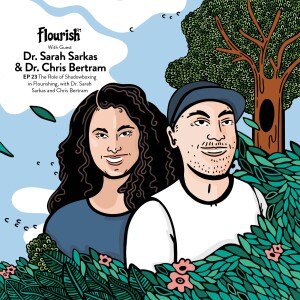
Tuesday Apr 04, 2023
Tuesday Apr 04, 2023
Today we are joined by “Jedi of the unconscious”, Dr. Sarah Sarkis, and applied neuroscientist, Dr. Chris Bertam. Between the two of them, they have a vast range of expertise which converges on their common pursuit, the Shadowboxing Podcast. In this episode, we discover what shadowboxing is and how it relates to flourishing.
Chris and Sarah share their thoughts on what it means to flourish, how it relates to flow, and the importance of learning to tolerate struggle. Theory aside, our guests impart some practical advice for increasing your tolerance for discomfort, from cold water submersion to the simple art of breathwork. Tune in for some helpful tools for overcoming shadow boxes and ultimately, flourishing.
Key Points From This Episode:
Introducing Drs. Chris Bertram and Sarah Sarkis.
The genesis of the name of their podcast, Shadowboxing.
What “shadowboxing” means to Sarah and Chris, respectively.
The shared goal of their collaboration.
Sarah and Chris’ range of expertise and the effectiveness of an integrated approach.
How our guests conceptualize flourishing.
The crossover between flow and flourishing.
Discussing the value of struggle.
How to increase your tolerance for discomfort.
The benefits of controlled exposure to cold water.
Exploring the struggle of stillness.
The connection between shadowboxing and flourishing.
How it’s best to help people help themselves, and why it’s so important to do so.
Why Sarah believes that biology trumps psychology.
The mind-body connection and the effectiveness of breath work.
Tools for overcoming shadow boxes.
Chris and Sarah’s final words of (very practical) advice.
Links Mentioned in Today’s Episode:
The Antifragile Academy
Dr. Chris Bertram on LinkedIn
Dr. Chris Bertram on Instagram
Dr. Chris Bertram on Twitter
Dr. Sarah Sarkis
Dr. Sarah Sarkis on LinkedIn
Dr. Sarah Sarkis on Instagram
Dr. Sarah Sarkis on Twitter
Shadowboxing Podcast
EXOS
The Shipley School
Flourish FM Podcast
Flourish FM on Twitter
Flourish FM on Instagram
Jon Beale
Nick Holton
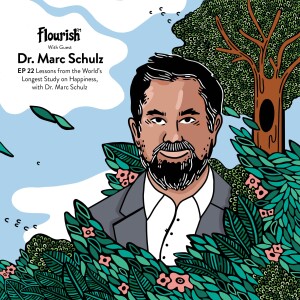
Tuesday Mar 21, 2023
Tuesday Mar 21, 2023
In today's episode, we go deep into the idea and components of a good life with Associate Director of the Harvard Study of Adult Development, Dr. Marc Schulz. Marc is the co-author of the The Good Life (2023), a Professor of Psychology at Bryn Mawr College, a psychologist, and a practicing therapist.
This conversation covers a selection of the interesting and enriching findings presented in Marc's book, practical strategies for developing social fitness, where material wealth should fit into our priorities, and why difficult experiences are such a necessary component of flourishing. The main thrust of Marc's recent work and today's chat is the central importance of relationships and how we can best aid the nurturing and maintenance of these.
Key Points From This Episode:
Marc introduces the Harvard Study of Adult Development and the field of adult development.
Clarifying the language used in the study and the two components that make up the 'good life'.
Forging a good life through challenges and difficult experiences.
The themes of aspiring and becoming in Marc's understanding of flourishing.
Marc talks about the different types of relationships that contribute to a good life.
Navigating and handling the inevitable conflict in our relationships.
Gratitude and appreciation and the benefits of generosity and giving.
The critical role that relationships play in the maintenance of happiness and health.
Marc unpacks the idea of social fitness and how we build it through reflection and awareness.
Money and happiness; the healthiest ways to use material ambitions as a means rather than an end.
Human weakness around forecasting and common regrets that Marc has identified.
Marc's strategies for avoiding unnecessary regrets and improving forecasting.
A story from The Good Life about human connection, shared interests, and hope.
Maintaining human connections within the array of demands on our time.
Marc's closing lesson about flourishing and leaning into relationships.
Links Mentioned in Today’s Episode:
The Antifragile Academy
Dr. Marc Schulz
The Good Life
Marc Schulz on LinkedIn
Bryn Mawr
Harvard Study of Adult Development
Robert Waldinger
Lydia Denworth
Why Good Things Happen to Good People
Stephen Post
Dan Pink
Robert Waldinger TED Talk
The Shipley School
Flourish FM Podcast
Flourish FM on Twitter
Flourish FM on Instagram
Jon Beale
Nick Holton
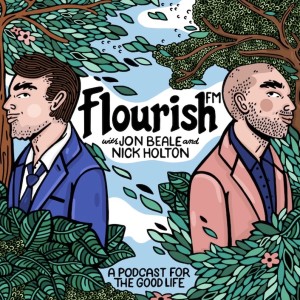
Tuesday Feb 28, 2023
Tuesday Feb 28, 2023
In this episode, we talked to Dr. Gilda Scarfe, expert on mental toughness, about what mental toughness is and how to build it.
Gilda Scarfe is the founder and CEO of Positive Ed & the Mental Toughness Institute, and a member of the advisory board for the Global Flourishing Study, led by the Human Flourishing Program at Harvard University, Baylor University and Gallup. Gilda is a positive psychology practitioner and mental toughness expert with a Ph.D. in the conceptualization of mental toughness and its application in education. She has worked in performance psychology, mental toughness, and leadership science for over 15 years.
Gilda specializes in the design and implementation of flourishing and mental toughness in learning, decision-making, quality of relationships, performance, and organizational climate; measuring mental toughness; and the influence of mental toughness training on key life outcomes.
Gilda is an international keynote speaker and consults around the world with school and Fortune 500 companies on best practices for integrating wellbeing, mental toughness and positive psychology domains into training and product design. She works with global businesses, high-growth startups, individuals, elite athletes, coaches and teams.
Key conversation points:
What mental toughness is: Gilda’s “SCARFE” model of mental toughness, consisting of Self-efficacy; Commitment (the extent to which you follow through with a promise); Attitude; Relationships; Focus; and Emotional agility
The importance to mental toughness of regulating our reaction to stress, self-awareness - being in tune with and responding to our emotions, and being in tune with our emotions
The emphasis in Gilda’s work of building and expanding people’s agency, and the importance of self-efficacy to human agency
Why the ability to create an accurate narrative about your life is important for building mental toughness
The extent to which mental toughness is a personality trait and the extent to which it’s learned
The virtues and strengths involved in mental toughness, including perseverance; curiosity; grit; resilience; patience; temperance; self-regulation; and distress tolerance
How to connect mental toughness with knowing when to persevere with grit and knowing when to quit
What “cognitive flexibility” is and why it’s important for mental toughness, particularly in building the skills to be able to change commitments and navigate change

Tuesday Feb 21, 2023
Tuesday Feb 21, 2023
In this special episode, Jon and Nick were interviewed about the science of flourishing and what it means to flourish by performance coach and strategist J.R. Reid, for his podcast, Coming Up Clutch.
Key conversation points:
What human flourishing is and how you can experience it
The two greatest predictors of general well-being, life satisfaction, and fulfillment
What you can’t miss if you want to have more life-satisfaction and experience fulfillment
Highlights:
[00:01 - 11:50] Introducing Nick and Jon
Nick's and Jon’s most embarrassing moment
Nick's and Jon’’s backgrounds, stories, and professional journeys
[11:51 - 21:00] What human flourishing is and how you can experience it
Jon:
Methodology behind the research: Identify the things in life that you do for the pursuit of nothing else (i.e. doing the thing is an end in itself). Do that with no further goal in mind.
Flourishing research today looks for multiple areas of life that you do just for the sake of doing it (e.g. pursuing relationships, being happy, being satisfied, fulfilling your potential, experiencing flow, etc.) and figuring out ways that you can enhance those as much as possible in your life.
Key areas:
Fulfillment, of potential and in the sense of life satisfaction
Flow
Close social relationships
Happiness & positive emotions
Character strengths or virtues
Mental and physical health
Meaning and purpose
Accomplishment
There’s no research that says you have to reach a baseline in each of those areas to flourish.
Human Flourishing Program at Harvard's account: your individual well-being is high and your well-being in relation to others and your context is high (i.e. defined interpersonally, among a community). So you can have high well-being, yet not be flourishing.
Positive psychology: if you have high psychological well-being, then you’re flourishing.
Nick:
What’s not in the Human Flourishing Program at Harvard’s account of flourishing: achievement or success.
The gap between fulfillment and success is often because we’re relying on the end goal of success (i.e something done for a very specific outcome).
Flourishing is well-being, generally feeling good (but not necessarily all the time), and performing optimally in areas of meaning.
Areas of meaning is important because if you perform optimally in something you’re forced into, it won’t provide the same level of satisfaction as someone who’s performing optimally in areas of meaning.
[21:01 - 24:45] The role purpose plays in flourishing
Research: Asking the question about your personal “Why?” in life is conceptually different than purpose.
Purpose is a sub-component or pathway to meaning (i.e. it’s about impact and contribution) - ”it’s a bit of the 'me' and a bit of the 'we'.”
The best of the best have both extrinsic and intrinsic motivations, but they’re predominantly intrinsic (i.e. they know what their why is and what they’re doing each day, and orient their day around it via calendaring, recovery, etc.).
Success on the field of competition is not an automatic route to well-being, life satisfaction, meaning, or fulfillment.
[24:46 - 34:15] The two greatest predictors of general well-being, satisfaction of life, and fulfillment
Meaning
Quality of relationships (social connection, community, intimacy, friendship, etc.)
2018: In the UN’s annual happiness report regarding satisfaction in the workplace, #1 predictor of workplace satisfaction was interpersonal relationships (i.e. we have to like the people we work with); #2 was that we must find our job interesting (#3 was pay).
Jon regarding money: common mistake people make is confusing a means with an end in terms of how they’re living their lives (i.e. they’re focusing on the means rather than the end).
The “when I _______, I’ll focus more on my relationships. Until then, I’m going to grind it out.”
Money can help prevent you from suffering, but it can’t be an end in itself (i.e. it’s not the end source of fulfillment). Once all your material needs are completely met, it’s generally not doing much for you.
Human beings can’t help but compare themselves to others.
[34:16 - 41:53] What you can’t miss if you want to have more life-satisfaction and fulfillment
Nick:
Ask yourself: What’s your recipe for a good life?
What ingredients do you want?
How much of each ingredient do you need?
Intentionality - cook your recipe!
What’s most important to you (i.e. want), when does it hit a point of diminishing returns (i.e. need), and how do you put the recipe together?
Jon:
Part of the journey to living a good life is identifying what works best for you and what makes you different from other people.
Enhance the eight domains that research says are ends in themselves, but don’t focus on making one far surpass the others thus to the detriment of the others.
Happiness and other positive emotions
Good, close social relationships
Meaning and purpose
Flow
Accomplishment
Mental and physical health
Character (developing strengths and character virtues)
Fulfillment, of potential and in the sense of life satisfaction
[41:54 - 46:58] What’s anti-fragility and how can we leverage it to become a better leader?
Fragile = adversity strikes, we brake
Resilient = adversity strikes, we navigate it and come out the other side
Antifragile = adversity strikes, we navigate it, come out the other side, and grow our capacity because of it (this is not the “suck it up” attitude or rigidity)
The goal: develop stress tolerance to unpleasantness, because research tells us we need unpleasantness to grow
[46:59 - 54:01] Wrapping Up
Nick and Jon’s big domino
How to connect with Nick and Jon
KEY QUOTES
“Success is not an automatic route to meaning and fulfillment” - Dr. Nick Holton
“For life satisfaction, don’t over-index on money.” - Dr. Nick Holton
“Part of the journey to living a good life is identifying what works best for you.” - Dr. Jon Beale
“Prioritize what matters the most to you.” - Dr. Jon Beale
You can also check out this podcast on Coming Up Clutch.
CONNECT WITH NICK AND JON
Nick
The Antifragile Athlete: theantifragileacademy.com
FlourishFM Podcast: flourishfmpodcast.com
Linkedin: /in/nickholton
Twitter: @dr_nickholton
Instagram: @dr.nickholton
Jon
FlourishFM Podcast: flourishfmpodcast.com
Linkedin: /in/jonathanbeale
Twitter: @DrJonathanBeale
Instagram: @jonnybeale
Facebook: @jonnybeale
CONNECT WITH J.R.
Facebook: @jamesJRreid
Instagram: @jamesjrreid
LinkedIn: in/jamesjrreid/
Twitter: @jamesJRreid
Website: jamesreid.com
Podcast: jamesreid.com/podcast
RATE & REVIEW this episode on Apple: https://jamesreid.com/review
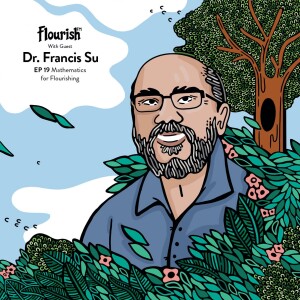
Tuesday Jan 17, 2023
Tuesday Jan 17, 2023
In this episode, we talked to Professor Francis Su about the role of mathematics in flourishing, how mathematics can promote flourishing, and his argument that the purpose of mathematics is to support flourishing.
Francis Su is the Benediktsson-Karwa Professor of Mathematics at Harvey Mudd College and a former president of the Mathematical Association of America. In 2013, he received the Haimo Award, a nationwide teaching prize for college math faculty, and in 2018 he won the Halmos-Ford writing award. His work has been featured in Quanta Magazine, Wired, and the New York Times. His 2020 book Mathematics for Human Flourishing, which won the 2021 Euler Book Prize, offers an inclusive vision of what math is, who it’s for, and why anyone should learn it.
Key conversation points:
Francis’ definition of flourishing as a “wholeness of being and doing” and the way he distinguishes between flourishing and happiness
Francis’ argument on the role of mathematics in human flourishing
How mathematics can cultivate virtues important for flourishing and which virtues mathematics can cultivate in a particularly strong way
Francis’ approach towards teaching mathematics in such a way as to cultivate virtues among students of mathematics, such as creativity and an appreciation for beauty
Francis’ correspondence with Christopher Jackson, an inmate serving a 32-year sentence for armed robberies who started writing to Francis seven years into his sentence, about his passion for mathematics, and the influence this correspondence has had on Francis’ work on mathematics and flourishing, and how he sees mathematics
Francis’ views on how mathematics education needs to change to cultivate virtues
francissu.com
flourishfmpodcast.com
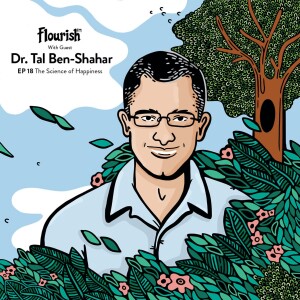
Tuesday Jan 03, 2023
Tuesday Jan 03, 2023
In this episode, we talked to happiness expert Dr. Tal Ben-Shahar about the science of happiness, focusing on his account of happiness as “wholebeing,” comprised of five elements of well-being which make up his “SPIRE” model: Spiritual, Physical, Intellectual, Relational and Emotional well-being.
Tal Ben-Shahar is an author and lecturer who taught two of the largest classes in Harvard University’s history, Positive Psychology and The Psychology of Leadership, and taught Happiness Studies at Columbia University. His books on happiness have been translated into more than thirty languages and have appeared on bestseller lists around the world, and his work has featured on media outlets including CNN, BBC and the Daily Show.
Tal obtained his PhD in Organizational Behavior and BA in Philosophy and Psychology from Harvard. Today he consults and lectures around the world to executives in multinational corporations, including Google and Microsoft, the general public, and at-risk populations. Tal is a serial entrepreneur, and is the co-founder and chief learning officer of Happiness Studies Academy, Potentialife, Maytiv, and Happier.TV.
Key conversation points:
How Tal defines happiness and its relation to flourishing: flourishing is the outcome of happiness
The relation between Tal’s “SPIRE” model of happiness and flourishing, and between happiness and wholeness
Tal’s definition of spirituality as living a life in which we see our activities as meaningful and purposeful
Practices for building spiritual wellbeing: exercise to write down a “calling description” rather than a job description
Tal’s criticism of widespread hurriedness today, and a strategy for going through life in less of a hurry
The connection between happiness and “antifragility”
Antifragility as “Resilience 2.0,” and its connection with post-traumatic growth: not only bouncing back, but becoming stronger and healthier than before
A principle Tal recommends for recovering from trauma: “things don’t happen for the best, but we can make the best of things that happen,” and how to apply this to our lives
The connection between physical exercise and happiness: “not exercising is like taking a depressant”
talbenshahar.com
happinessstudies.academy
flourishfmpodcast.com

Your Title
This is the description area. You can write an introduction or add anything you want to tell your audience. This can help potential listeners better understand and become interested in your podcast. Think about what will motivate them to hit the play button. What is your podcast about? What makes it unique? This is your chance to introduce your podcast and grab their attention.







